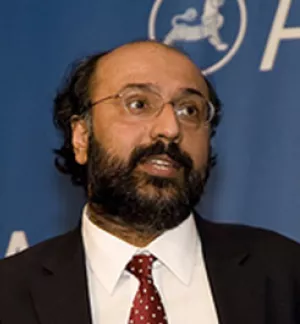On the eve of the 9/11 terror attacks, in a crucial National Security Council meeting at the White House, Colin Powell, the then U.S. secretary of state, strongly asserted: "We have to make it clear to Pakistan and Afghanistan, this is show time."
General Mahmood Ahmed, who was on an official visit to the United States as a CIA guest, and Maleeha Lodhi, Pakistan’s ambassador to the United States, were asked to attend a meeting with senior American officials on September 12, 2001. To be fully prepared, Mahmood called Musharraf to discuss the emerging scenario and take instructions for the important meeting. Musharraf told him to report back immediately after the meeting and gauge how the wind was blowing. On the morning of September 12, the U.S. deputy secretary of state, Richard Armitage, in a "hard-hitting conversation," told Mahmood that Pakistan had to make a choice—"you are either 100 percent with us or 100 percent against us—there is no gray area." In the words of Armitage, Mahmood "was immediately willing to cooperate." In the afternoon, Mahmood was invited to CIA headquarters at Langley, Virginia, where he told George Tenet, the CIA director, that in his view Mullah Omar, the Taliban chief, was a religious man with humanitarian instincts and not a man of violence! This was a bit difficult for the CIA officials to digest. General Mahmood was firmly told that Mullah Omar and the Taliban would have to face U.S. military might if Osama bin Laden along with other Al-Qaeda leaders were not handed over without delay. To send the message across clearly, Richard Armitage held a second meeting with Mahmood the same day, informing him that he would soon be handed over specific American demands which are "non-negotiable", to which Mahmood reiterated that Pakistan would cooperate.
Having gone through the list that was provided to him on September 13, Mahmood declared that he was quite clear on the subject and that "he knew how the President thought, and the President would accept these points." Mahmood then faxed the document to Musharraf and in a subsequent call conveyed his impressions. Mahmood was of the view that the words used by Armitage about Taliban were in fact meant for Pakistan and he didn’t consider it necessary to emphasize this point. Musharraf genuinely believed that such a direct threat was given. While Musharraf had hardly gone through the list of demands, his aide de camp informed him that Colin Powell was on the line. Musharraf liked and respected Powell, and the conversation was not going to be a problem, he thought. He told him that he understood and appreciated the U.S. position, but that he would respond to the U.S. demands after having discussed these with his associates. Powell was a bit perplexed at this response and thought it necessary to inform him that General Mahmood had already assured them that these demands would be acceptable to the government of Pakistan. It is not certain if Musharraf bit his lip when he heard this, but he did grit his teeth, and his relationship with Mahmood suffered a crack. Interestingly, Mahmood on his return from the US, also informed Musharraf about his visit to the Pentagon after the tragedy and argued that there were no traces of any commercial plane having hit the Pentagon. He also made a case that in his assessment, the attacks were an inside job! Some senior generals surrounding Musharraf at that time were convinced by this line of argument largely based on Mahmood’s "first hand" narrative.
On September 16, 2001, Musharraf sent a delegation to the Taliban with the mission to convince them to hand over Osama bin Laden. It included Lieutenant General Mahmood, and a group of religious figures known to have good relations with the Taliban. The mission failed, but more worrisome was the revelation that Mufti Shamzai of the Binori mosque in Karachi, instead of conveying the official message, encouraged Mullah Omar to start a jihad against the United States if it attacked Afghanistan. Musharraf came to know of this fact through an ISI official who had accompanied the team and had loyally reported the matter to Musharraf. After this, Mahmood, whose arrogance and presumption had come to grate on Musharraf’s expansive tolerance by now, was offered the ceremonial slot of chairman of the Joint Chiefs of Staff Committee, because Musharraf was still grateful to him for what he had done for him on the eve of October 12, 1999. Mahmood refused the offer thinking that he was indispensable and a possible successor to Musharraf. But things were changing fast and Musharraf now had the support of most of his corps commanders about his new alignment with the US (except Generals Usmani, Mahmood and Mohammad Aziz who had advised caution). Gauging the mood of changing circumstances and knowing that Musharraf was about to make some important changes in the military, Mahmood, through a close friend of Musharraf, a retired brigadier based in Islamabad, put in a request to be retained as director general of ISI, even if an officer junior to him was to be promoted to the rank of four star general for the post of CJCSC. This time Musharraf refused and Mahmood had to go home.
This sudden departure of Mahmood led to many rumors. Mahmood went into a low profile and started working on his favorite project—a book on the 1965 war. When he finished the work, he sent the manuscript to GHQ for permission to publish. Interestingly the title of the work was "Myth of 1965 victory". Musharraf himself looked at the manuscript and noted on the file that Mahmood should re-consider the title—especially use of the word myth in relation to the 1965 war. This was enough of a hint and Mahmood almost shelved the idea of publishing the book for a while. Mahmood had already requested Musharraf for a job and thought that he should not annoy Musharraf on any count. He was right—he did get a job soon. And instead, Musharraf started working on his book project.
Hassan Abbas, a former Pakistani government official is now a fellow at the Kennedy School of Government, Harvard University. He is the author of "Pakistan’s Drift into Extremism: Allah, the Army and America’s War on Terror (M E Sharpe, 2005)
Abbas, Hassan. “Inside Story of Musharraf-Mahmood Tussle.” Daily Times, September 26, 2006


